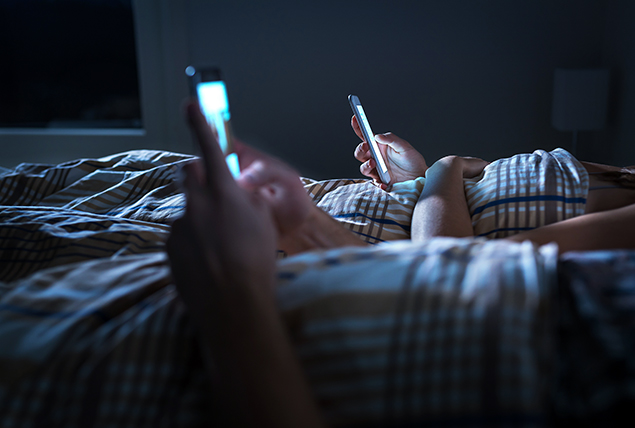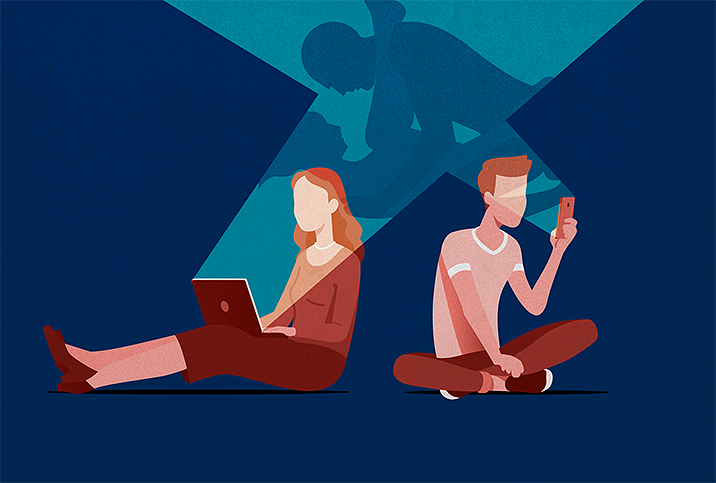What Is Social Media Doing to Our Sex Lives?

In May 2022, research published in the Journal of Sexual Medicine linked "problematic use" of social media to lower libido, more difficulty having orgasms and overall dissatisfaction with sex. As if that weren't enough, researchers claimed excessive social media consumption can make cisgender men less likely to get hard and cis women less likely to get wet.
The damning report spawned tabloid headlines that isolated the correlation between women using social media and being unable to climax. As a result, you might think TikTok alone makes women unable to orgasm.
There's a lot to unpack, but the study does add to a growing body of evidence that social media can be bad for our sex and love lives. Research published in 2022 in Frontiers in Psychology took specific aim at the practice of "phubbing," or ignoring your partner to focus on your phone instead. Researchers surveyed 504 Chinese adult respondents and found "romantic relationship satisfaction is negatively correlated with phubbing."
As researchers continue to explore these links, it's worth delving deeper to figure out exactly what social media is doing to our sex lives.
Everything in moderation, including social media
Generally, studies linking social media to sexual dysfunction focus on "problematic" or "addictive" social media use, like a 2019 study of Iranian women. These metrics are usually based on the Bergen Social Media Addiction Scale, a self-reported, six-answer questionnaire. Not only can self-reported statistics be unreliable, studies focusing solely on problematic use obscure parts of the bigger picture.
Similarly, researchers often link phubbing more generally to "addictive" social media behavior.
"Many get so used to scrolling through their phones that it becomes a habit," explained Marisa T. Cohen, a psychology professor and relationship researcher for dating app Hily in New York City. "Phubbing can cause us to miss emotional bids, or our partner's requests for connection, whether these requests are physical or verbal."
There's the pandemic to contend with, too. The rise in the number of people working from home and the months of self-isolation have made it harder for many of us to detach from our phones.
"It is completely normal to get distracted," said Charlotte Johnson, an in-house sex and relationship expert at online sex shop MegaPleasure in the United Kingdom. "It's important to step away from your phone sometimes and not let yourself get overly consumed."
There are resources to help with this problem, like apps that place timed blocks on social media sites and "digital well-being" tools that encourage us to be mindful of overconsumption.
Follow selectively on social media
It's crucial to look not only at how much we consume, but what we consume. Like media more generally, Cohen explained that social media can lead to "misconceptions around how much sex is 'normal,' the type of sex we should be having and how long sex should last."
None of us are immune from this messaging, but we can be selective with our engagement in order to combat it.
Increasingly, social media is being used as a tool for sex education because comprehensive, inclusive sex ed in schools is still limited and the internet is filling these gaps.
A 2018 study of minority youth in the United States found youth who were exposed to sexual health messages on social media were more than twice as likely to use contraception during sex, indicating those who don't normally see themselves represented may be more likely to identify with the comparative diversity of social media sex ed. It's not just public-facing social media that can have this effect.
United Kingdom research published in the Journal of Medical Internet Research stated that "Invitation-only social media groups formed around peer supporters' existing friendship networks hold potential for diffusing messages in peer-based sexual health interventions."
Discord servers and Facebook groups are just two examples of invitation-only social media groups.
Both Cohen and Johnson concurred, citing the potential positive effects of social media on sex and sexual health.
"Knowledge on sex and sexual desires are more visible on social media now," Johnson said. "People are more likely to study this, discuss it with their partner and enjoy sex more. This can lead to stronger connections between couples as they start to understand each other's bodies and kinks, resulting in longer-lasting relationships and better sex."
Cohen similarly credited social media with holding the potential to "dispel misconceptions, normalize our experiences and create community around these important topics."
Where do we go from here?
Anyone familiar with the "orgasm gap" knows straight, cis women are generally less likely than others to orgasm during intercourse, and many don’t orgasm through penetration alone. Blaming social media for a phenomenon that existed well before its creation is misplaced. And men’s erectile issues can be caused by physical and psychological factors too numerous to list.
People who feel they are underrepresented in sex education and in culture more generally are likely to seek knowledge and possibly camaraderie in the work of people who look and think as they do. That can include kink educators, disabled sex educators, people of similar color and queer accounts whose resources are rooted in lived experience––the kind of experience that can teach users how to navigate the minefields of sex and dating, as well as offer safer sex resources. Social media can be useful in seeking these resources.
It's generally accepted knowledge that too much of anything can be detrimental––and social media is no exception. But unless you self-define as a problematic scroller, it's unlikely your screen time alone will make it harder to orgasm.



















Commentary